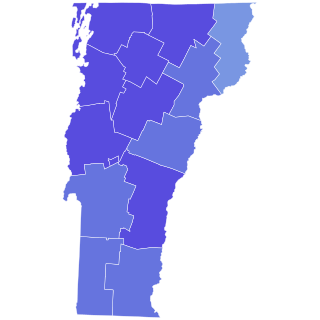
Patrick Joseph Leahy, is an American politician and attorney who represented Vermont in the United States Senate from 1975 to 2023. A member of the Democratic Party, he also was the president pro tempore of the United States Senate from 2012 to 2015 and from 2021 to 2023.

Frederick Herman Tuttle was an American dairy farmer, actor, United States Army veteran of World War II, and Republican candidate for the United States Senate from Vermont in 1998. He lived in Tunbridge all his life, and attended South Royalton High School before dropping out after the tenth grade to begin a career as a dairy farmer. He served in the U.S. Army during World War II, and participated in military actions in the European Theater.

The 2006 United States Senate election in Vermont was held November 7, 2006. Incumbent independent Senator Jim Jeffords decided to retire rather than seek reelection to a fourth term, and Bernie Sanders was elected to succeed him.

The 2004 United States Senate election in Alaska took place on November 2, 2004, alongside other elections to the United States Senate in other states as well as elections to the United States House of Representatives, various state and local elections, and the presidential election of that year. Incumbent Republican U.S. Senator Lisa Murkowski of Anchorage, sought election to her first full term after being appointed by her father Frank Murkowski to serve out the rest of the latter's unexpired term when he resigned in December 2002 to become Governor of Alaska. Her main challenger was Democratic former governor Tony Knowles, her father's predecessor as governor. Murkowski won by a slight margin. As of 2022, Lisa Murkowski’s vote total of 149,773 votes remains the most raw votes she has ever received during any of her runs for the US Senate.

The 2010 United States Senate election in Vermont took place on November 2, 2010, alongside other elections to the United States Senate in other states as well as elections to the United States House of Representatives and various state and local elections. Incumbent Democratic U.S. Senator Patrick Leahy was re-elected to a seventh term.

The 1998 United States Senate election in Vermont was held November 3, 1998. Incumbent Democratic U.S. Senator Patrick Leahy won reelection to a fifth term.

The 1992 United States Senate election in Vermont was held on November 3, 1992. Incumbent Democratic U.S. Senator Patrick Leahy won re-election to a fourth term.

The 1986 United States Senate election in Vermont was held on November 4, 1986. Incumbent Democratic U.S. Senator Patrick Leahy won reelection to a third term, defeating Republican former governor Richard Snelling by a landslide margin of almost 30 points, in a race that was initially expected to be quite competitive, as Snelling was recruited to run by popular President Ronald Reagan.

The 2016 United States Senate election in Vermont was held November 8, 2016, to elect a member of the United States Senate to represent the state of Vermont, concurrently with the 2016 U.S. presidential election, as well as other elections to the United States Senate in other states and elections to the United States House of Representatives and various state and local elections. The primaries were held August 9.

The 1980 United States Senate election in Vermont took place on November 4, 1980. Incumbent Democratic U.S. Senator Patrick Leahy narrowly won reelection to a second term, defeating Republican Stewart Ledbetter, the former Vermont Commissioner of Banking and Insurance.

The 2018 United States Senate election in Maryland took place on November 6, 2018, in order to elect a member of the United States Senate to represent the State of Maryland. It was held concurrently with other elections to the United States Senate, elections to the United States House of Representatives, and various state and local elections. Incumbent Democratic U.S. Senator Ben Cardin was re-elected to a third and ultimately final term by a landslide margin of almost 35 points, the largest margin in any election for this seat since Maryland began holding direct elections for Senate in 1913.

The 2018 United States Senate election in Utah took place on November 6, 2018, to elect a member of the United States Senate to represent the State of Utah, concurrently with other elections to the United States Senate, elections to the United States House of Representatives, and various state and local elections. The primaries took place on June 26.

The 2018 Vermont gubernatorial election took place on November 6, 2018, to elect the Governor of Vermont, concurrently with the election of Vermont's Class I U.S. Senate seat, as well as other elections to the United States Senate in other states and elections to the United States House of Representatives and various state and local elections. Incumbent Republican Governor Phil Scott, who was first elected in 2016, was re-elected to a second term in office. Hallquist's 40.3% was also the worst performance for a Democratic Party candidate since 2008. This was one of eight Republican-held governorships up for election in a state that Hillary Clinton won in the 2016 presidential election.

The 2022 United States Senate election in Vermont was held on November 8, 2022, to elect a member of the United States Senate to represent the state of Vermont. It was held concurrently with U.S. Senate elections in other states, along with elections to the United States House of Representatives and various state and local elections across the country. The incumbent senator, Democrat Patrick Leahy, announced on November 15, 2021, that he would not seek re-election to a ninth term, leaving the seat open for the first time since 1974.

The 2018 United States House of Representatives election in Vermont was held on November 6, 2018, to elect the U.S. representative from the state of Vermont from Vermont's at-large congressional district. The election coincided with other elections to the House of Representatives, elections to the United States Senate and various state and local elections. The primary elections were held on August 14. Peter Welch, a Democrat won reelection to a seventh term, defeating Republican Anya Tynio.
John A. McMullen, known as Jack McMullen, is an American businessman from Vermont and former politician. He is most notable for his unsuccessful runs for U.S. Senator in 1998, and again in 2004, as well as his unsuccessful candidacy for Vermont Attorney General in 2012.

The 2020 Vermont gubernatorial election was held on November 3, 2020, to elect the Governor of Vermont. As Vermont does not impose term limits upon its governors, incumbent Republican Governor Phil Scott was eligible to run for re-election to a third two-year term in office. On November 18, 2019, he confirmed that he was running for reelection, but did not yet publicly announce his campaign. On May 28, 2020, he officially announced his candidacy but stated that he would not campaign, maintain a campaign staff, or fundraise because of the state of emergency due to the COVID-19 pandemic in Vermont. The primary was held on August 11. Scott won re-election to a third term in a landslide, defeating Progressive and Democratic nominee, Lieutenant Governor David Zuckerman.

A general election was held in the U.S. state of Vermont on November 3, 2020. All of Vermont's executive officers were up for election, as well as Vermont's at-large seat in the United States House of Representatives. Primary elections were held on August 11, 2020.

The 2022 United States House of Representatives election in Vermont was held on November 8, 2022, to elect the U.S. representative from Vermont's at-large congressional district. The election coincided with other elections to the House of Representatives, elections to the U.S. Senate, as well as various other state and local elections.

The 2022 Vermont Senate election took place on November 8, 2022, as part of the biennial United States elections. The election coincided with elections for other offices including the U.S. Senate, U.S. House, Governor, and State House. Vermont voters elected all 30 state senators from 16 districts, with each district electing between one and three senators. State senators serve two-year terms in the Vermont Senate. Primary elections were held on August 9, 2022. This election would be the first to use new districts adopted by the Vermont General Assembly to allocate for population changes across the state after the 2020 census.























